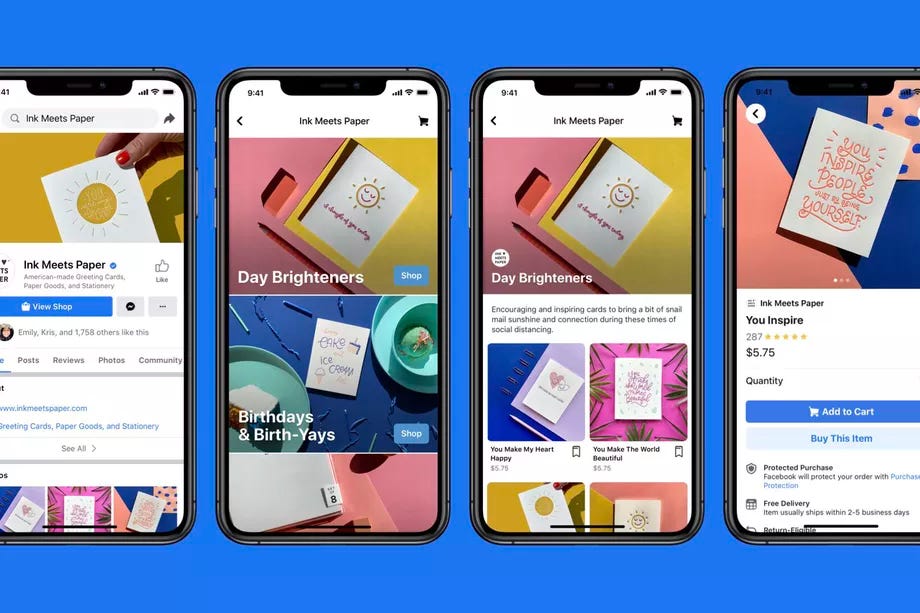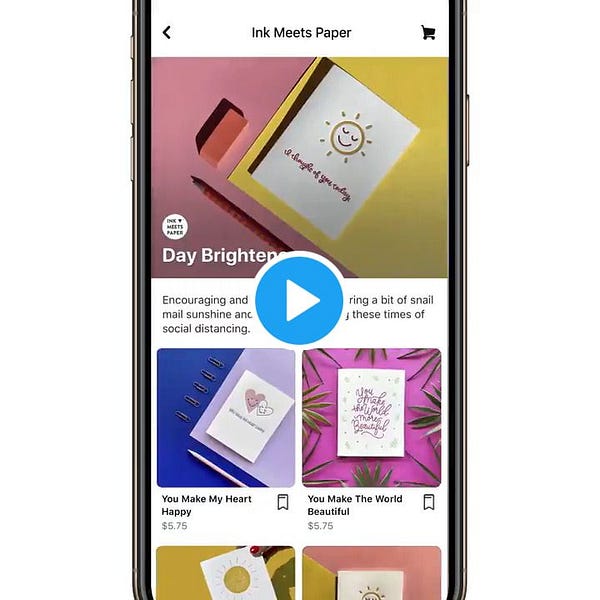Vanity Metrics #17.5
"ShopBook" has arrived.
Vanity’s on the drive to 100 subscribers, and we’re nearly there! If you’ve been enjoying Vanity Metrics over the last seven months and the work that goes into it, please consider helping us hit this milestone. Try sharing with your colleagues! Feel free to forward this email! Or just hit the share button below! It’ll make you look smart as heck, and helps me out too.
Our first Vanity Metrics Extra! edition. Facebook’s announcement yesterday opens up a major new landscape for commerce, and it’s worth its own quick primer. Let’s quickly run through what is and what it might mean for your current work, and the opportunities it presents for the future. Let’s get to it.
Facebook introduces Real eCommerce with Shops.

In a nutshell
Facebook dropped an eCommerce bomb on Tuesday, announcing that they are partnering with Shopify (and WooCommerce, Channel Advisor, CedCommerce, Cafe24, Tienda Nube, and Feedonomics) to bring online storefronts to their own dedicated section on Facebook and Instagram. Integration into Messenger and WhatsApp are in the pipeline.
Mark Zuckerberg took to Facebook Live to make the big announcement. Product video demo time!


This was likely in the works for a long time (you don’t create massive global partnerships over a Zoom meeting or two), and timelines were accelerated with the massive shift in local eCommerce brought about by COVID-19.
Master sleuth Jane Manchun Wong spotted the name change on Instagram a few days before the big reveal. We touched on some subtle changes happening for Shopping on IG in the last newsletter.


What does this mean?
Well, if you’re a small business, it means your ability to sell and reach customers just got a whole lot easier. Shopify has established itself as a world leader in eCommerce for a number of reasons: it’s easy to set up and maintain, looks appropriately professional for customers, and can handle all the back-end stuff I know little about (payments, shipping, etc). By linking it to the massive user base of the Facebook suite of apps you get a lot of advantages, for better or worse:
No longer will you need to duplicate all your work setting up two stores. Details are still coming but it looks like when you set up a Facebook Page and link it to your Shopify account, you’re largely done the initial steps. Details have not been released yet on how to create the “new” Shops.
As Facebook stores users’ payment details, they are betting shopping will be easier and therefore more likely in their ecosystem than users browsing the web or jumping off to sites not supported by Shops. This is already being used on Instagram’s “One-Touch Checkout” shopping to great success.
Discovery will be easier but still driven by ads. Facebook doesn’t do anything without figuring out how to monetize it first. And almost all of Facebook’s revenue comes from ads. So, yeah. Ads.
Facebook will be taking a cut of your sales. Because all of Facebook’s revenue is ad-driven, it has been looking for a way to break out of that risky box for a while. This is it. Facebook will charge a fee when users checkout via Facebook (I imagine Shopify does the same if the checkout process is handled by them).
What Should I do?
I think this offers a rare opportunity to position your brand among the “first consideration” spot on all future shopping in your SMB category… if you do the legwork now. Small business owners can make an oversized impression, and freelancers/agencies can market a la carte services to a range of businesses that may not have considered the investment before. First impressions? Planning will set you apart from those that take a slapdash approach.
Like all things Facebook, you’ll probably see a default need to establish a presence there with Shops. Your competition will. If you were considering setting up an online shop with Shopify, start the process now, so you can be in place when the doors open. First to market will matter.
Marketers: now is a great time to let small business owners know you are available to help them design/build/customize their eCommerce stores. Templates are great, but there’s value in making your Shop stand apart.
Surfacing your store (locally if you’re brick and mortar, or targeted if shipping is your focus) with discovery ads will be a crucial step to getting eyeballs on your Shop and habituate shopping at your store first before the market is oversaturated with low-quality ads to questionable storefronts. Work with a professional creative/agency to create some great quality assets and get a campaign going as soon as you’re open. Support local on both sides!
Marketers: start to consider creating packages specifically designed to get small businesses up and running on Shops, and let them know you are available. I offer a one-time package to help create a high-level strategy for small businesses that can’t afford ongoing retainers to give them the tools and thinking to execute on their own. More often than not, they see success and return to work together on additional services/campaigns.
If your skillset includes Augmented Reality, or know someone who is, now is the time to start marketing those skills. Facebook intends to lean heavily into AR when it comes to shopping: automatically tagging videos (and live streams) with products for sale, and integrate other AR features like “virtual try-on” for products.
Live Shopping is another feature quietly mentioned but has big potential to differentiate you as a credible brand. New features are coming to allow you to live stream sessions where you can link up to and directly sell products. Sound like QVC? Sort of. Does it have to be? Nope! Again, working with a marketing pro will really help you game this out and set you apart from competitors.
Marketers: if you have the AV equipment and knowledge, consider offering live streaming solutions for small businesses. You can extend your video offerings by investing in encoding hardware that won’t break the bank, and multiplexing solutions to go live across several platforms simultaneously. I’d keep my eyes out for the requirements when they come available.
TL;DR: this is a big opportunity for small businesses and small agencies alike. There will be a lot more to come on this topic! Food for thought.
Ryan LaFlamme has worked in social media marketing and advertising for longer than the job had a title. He formed the independent social consultancy Hub and Spoke in 2016, and can be found hanging out on Twitter @ryanlaf Now accepting new clients and speaking engagements.

